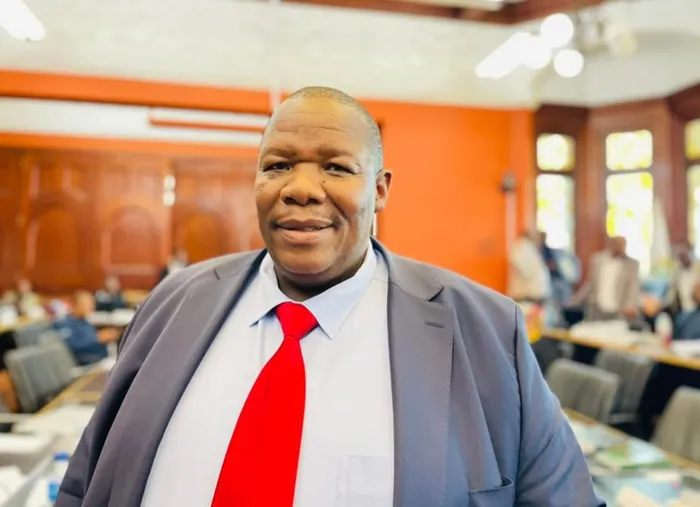Msunduzi Municipality warns residents about consequences of unpaid services

Msunduzi Municipality Mayor Mzimkhulu Thebolla tabled the city's budget on Wednesday.
Image: Supplied
Residents of Msunduzi Municipality in Pietermaritzburg, KwaZulu-Natal Midlands, have been warned of the consequences of continuing to refuse to pay for services, such as water, electricity, and rates.
Mayor Mzimkhulu Thebolla issued the warning when he tabled the city’s R18 billion 2025/2026 budget on Wednesday. Out of this budget, R9.6 billion would focus on service delivery, while R8.5 billion would be on operational expenses.
He said the city had encountered an increase in electricity theft through illegal connections.
“Our Operation Qoqimali (collect the bills) Campaign is about stopping the prevailing culture of non-payment.
“The electricity theft is a crime, like all forms of illegal connections, a criminal offence,” he said.
Thebolla said the city loses tens of millions of rand in revenue per year, which he said was a theft of revenue that is much needed to enhance service delivery.
“We call for this practice to stop because to combat this, we will continue to work with the community and law enforcement to arrest the offenders and impose hefty penalties.”
He said the city was now prepared to adhere to the residents’ demand for better service delivery.
“This budget has been crafted with your (residents') concern at heart, focusing on the service delivery priorities.
“This would include improving public electricity lighting, stabilising power supply, reducing water losses, and safeguarding vital infrastructure.
“In formulating this budget, we have ensured that it is based on a financially sound plan and stabilise the city’s finances while prioritising service delivery,” he said.
Thebolla said capacitating revenue collection work streams to support the Operation Qoqimali Campaign would help the city to stabilise its finances.
“The project management office has been established to take charge of each aspect of the city’s revenue value chain.
“This includes rolling out prepaid electricity meters, dispatching bills, resolving disputes, and implementing credit control and debt collection measures such as issuing summons against debtors,” said Thebolla.
He said the court was in support of the city’s effort to deal with people who were ignoring paying for services.
“That is why we have already issued 40,000 letters of demand to defaulting customers who run up high service bills and fail to pay the city.”
He said the municipality had been forced to increase tariff by external elements such as the National Energy Regulator of South Africa (Nersa), which authorised Eskom and municipalities to increase electricity cost by 13.32% from July 1, and the Umngani/Uthukela Water Board, which proposed 15% increase of water tariffs for 2025/26 financial year.
“These adjustment factors in inflation include a margin dedicated to the infrastructure upgrade and maintenance, which is essential to alleviate pressure on aging and over-stretched electricity infrastructure.
“These adjustments are necessary to ensure sustainability, reliability and continued investment of service delivery,” said Thebolla.
He said the city has employed 400 workers through the Expanded Public Works Programme to go house-to-house to identify indigenous homeowners to be exempted from certain charges.
“So far, we have 5,978 people benefiting from the programme, and we aim to reach even more.
“To make this possible, we have increased the household income threshold to R6,110, ensuring that more low-income families access this vital support,” he said.
During a media briefing, Thebolla said the construction of the Integrated Public Transport Networks (IPTN) project to transform the public transport system, which was left unfinished in 2022, while it was supposed to be finished in 2021, would soon continue.
He expressed disappointment upon taking office in 2019 when the city was removed from the Integrated Public Transport Network (IPTN) programme.
“We have worked tirelessly since then, attending to all the challenges that the Department of Transport and the National Treasury cited as the reason for the removal of Msunduzi from that requirement.
“We are very excited to announce that we have now been re-accepted, which comes with its terms. There is R45 million that is set aside for mainly critical projects,” he said.
He said the city was removed from the project because it did not have a proper establishment for the implementation of the IPTN.
“Part of this R45 million goes directly to that, and we are going forward now with the implementation, and we are engaging all stakeholders, especially the taxi industry, who have been very supportive,” he said.
He also said the city would embark on expropriating privately owned abandoned buildings in the CBD, which have become a haven for criminals and unused land.
bongani.hans@inl.co.za
Related Topics:
